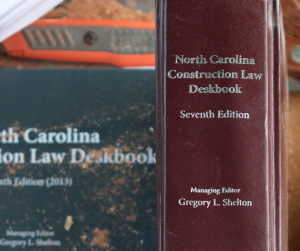The Lien Agent: What the Owner Needs to Know
By: Gregory L. Shelton
Shelton Law Carolinas
(704) 940-9012
The new lien agent law takes effect on April 1, 2013. This is the first of a series of posts designed to give construction industry participants in North Carolina a succinct step-by-step guide to the lien agent provisions.
The text, purpose, and history of the lien agent provisions have been discussed in great detail in Construction Law Carolinas and in other publications and blogs, so I won’t repeat that information here.
The lien agent provisions constitute a new layer of procedures under chapter 44A. Thus, the existing procedural steps and methods (notice of contract, notice of subcontract, notice of claim of lien upon funds, and claim of lien upon real property) should continue to be observed by everyone.
We start this series from the owner’s standpoint, because the owner is responsible for kicking off the lien agent process.
Step One: Determine whether you need a lien agent.
You are not required to appoint a lien agent if:
1. The cost of the undertaking (project) is less than thirty thousand dollars ($30,000) at the time the original building permit is issued; or
2. The owner is making improvements to an existing single-family residential dwelling unit that is used by the owner as a residence.
To reiterate, if either of these circumstances applies, you need not appoint a lien agent.
Step Two: Appoint a lien agent before contracting for the work.
If the exceptions set forth in Step One above do not apply, you are required to appoint a lien agent “no later than the time the owner first contracts with any person to improve the real property.” The lien agent requirement applies to residential and commercial construction projects. To appoint a lien agent, follow these simple steps:
1. Visit www.LiensNC.com and follow the prompts to log your project information.
2. Select a lien agent from the list provided on the website. You are welcome to select any lien agent you want. If you aren’t sure which lien agent to select, keep in mind that all notices go to the same office in Raleigh and will be handled by the same staff.
3. Post the building permit at the project site conspicuously (easy to find) and continuously during construction.
4. If no building permit is required for the project, print the “Appointment of Lien Agent” form and post a copy of this document, which contains the contact information for the lien agent, on a sign conspicuously and continuously on the property from the beginning to the end of construction.
A preview of this process is available by visiting www.liensncllc.com. The www.LiensNC.com site goes online on April 1, 2013.
In lieu of the straightforward and efficient website, you may appoint your lien agent using the time-consuming and tedious process of drafting a formal appointment of lien agent, visiting the North Carolina Department of Insurance website and identifying a lien agent, and transmitting the formal notice by certified mail, return receipt requested, signature confirmation through the US Postal Service, physical delivery with a delivery receipt from the lien agent, facsimile with facsimile confirmation, overnight courier such as UPS, FedEx, or DHL, or email with electronic delivery receipt.
Step Three: Respond to written requests for lien agent information
If you receive a written request by a potential lien claimant (contractor, subcontractor, supplier, design professional, etc.), you must:
1. Provide notice to the potential lien claimant within seven (7) days of receipt.
2. Written notice must contain the contact information for the lien agent, including:
- name of lien agent;
- physical and mailing address;
- telephone number;
- facsimile number; and
- electronic mail address (website if applicable).
3. Written notice must be sent to the potential lien claimant by the same delivery method used by the potential lien claimant in making the request. For example, if the potential lien claimant makes the request by personal delivery, you must personally deliver the lien agent information to the potential lien claimant.
Again, these lien agent provisions apply to residential and commercial projects alike. Talk of a carve out for commercial projects appears to have withered on the vine, at least for now. Finally, a bill (House Bill 180) containing technical amendments continues to work its way through the legislative process.
Step Four: Special Requirement Where Residential Contract with Contractor Contains Lien Agent Contact Information
When the lien agent is identified in a contract for a single-family residence, the owner is required to provide written notice to the lien agent containing the information that would be required in the contractor’s Notice to Lien Agent. The contractor will be deemed to have met its obligation to serve its Notice to Lien Agent. (In essence, the owner is required to serve the contractor’s Notice to Lien Agent by proxy.)
It bears repeating: This requirement only applies if the project consists of a single-family residence and the contract between the owner and contractor contains the lien agent contact information.


